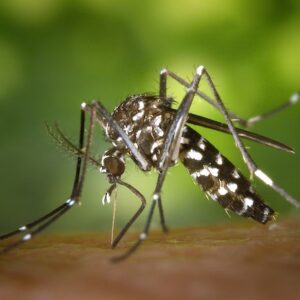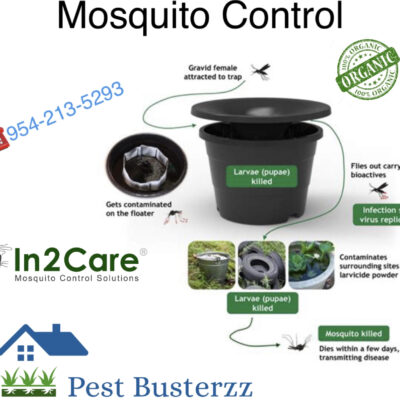10 Tactics to Banish Snails
...


Mosquitoes are small flying insects that belong to the Culicidae family. They are found all over the world, including in South Florida. Here’s some information about mosquito biology and behavior:
Life Cycle: Mosquitoes undergo a complete metamorphosis consisting of four stages: egg, larva, pupa, and adult. The entire life cycle can take anywhere from a week to several months, depending on the species and environmental conditions.
Habitat: Mosquitoes breed and lay eggs in stagnant water, such as ponds, swamps, and puddles. Female mosquitoes require blood to produce eggs and are attracted to humans and animals as a source of food.
Diseases: Mosquitoes are known to transmit various diseases, including malaria, Zika virus, dengue fever, and West Nile virus. South Florida has a history of mosquito-borne diseases, and it’s important to take precautions to prevent mosquito bites.
Prevention: To reduce the risk of mosquito bites and the spread of diseases, it’s important to eliminate standing water around your home, use mosquito repellent, wear protective clothing, and use screens on windows and doors.
Control: Mosquito control measures in South Florida typically involve the use of larvicides and adulticides to kill mosquito larvae and adults. These measures are typically implemented by government agencies to reduce the mosquito population and minimize the spread of mosquito-borne diseases.
In South Florida, mosquitoes are a significant problem due to the warm and humid climate, which provides ideal breeding conditions. Mosquito control efforts are particularly important in this region to protect public health.
There are several natural repellents that can help deter mosquitoes. While these natural repellents may not be as long-lasting or potent as chemical-based repellents, they can still provide some protection. Here are some natural mosquito repellents:
Citronella: Citronella oil is one of the most commonly used natural mosquito repellents. It can be found in candles, torches, and lotions. Burning citronella candles or using citronella oil-based repellents can help keep mosquitoes at bay.
Lemon Eucalyptus: The essential oil derived from lemon eucalyptus has been found to be effective in repelling mosquitoes. Look for products that contain this ingredient or make your own repellent by diluting the oil with a carrier oil like coconut oil.
Peppermint: Mosquitoes tend to dislike the strong scent of peppermint. You can use peppermint essential oil mixed with water in a spray bottle and apply it to your skin or clothing. Additionally, planting peppermint in your garden can help deter mosquitoes.
Lavender: Lavender has a calming scent for humans, but mosquitoes find it unpleasant. You can use lavender essential oil mixed with a carrier oil or water as a natural repellent. You can also plant lavender in your garden to repel mosquitoes.
Neem Oil: Neem oil is derived from the neem tree and has insect-repellent properties. Mix neem oil with a carrier oil and apply it to exposed areas of your skin. It is known to be effective against a variety of insects, including mosquitoes.
Garlic: Consuming garlic or rubbing garlic oil on your skin can produce a scent that deters mosquitoes. However, keep in mind that this may not be the most practical option due to the strong smell.
Remember to reapply these natural repellents more frequently compared to chemical-based repellents, as their effectiveness may not be as long-lasting. It’s also important to note that some natural repellents may cause skin irritation in some individuals, so perform a patch test before applying them to larger areas of your skin.
Mosquitoes can be a serious threat to your health. A single bite can spread many deadly illnesses such as West Nile Virus, encephalitis, malaria, yellow fever, Zika Virus, and more. If you’ve been bothered by even a few of these biting insects, contact us for a free, no-obligation inspection and quote on a customized organic mosquito treatment plan.

Here are nine common pests that can be found in South Florida: Mosquitoes – Mosquitoes are small, flying insects that are found throughout Florida. They are known for their ability to transmit diseases such as West Nile virus and Zika virus through their bites. Mosquitoes......